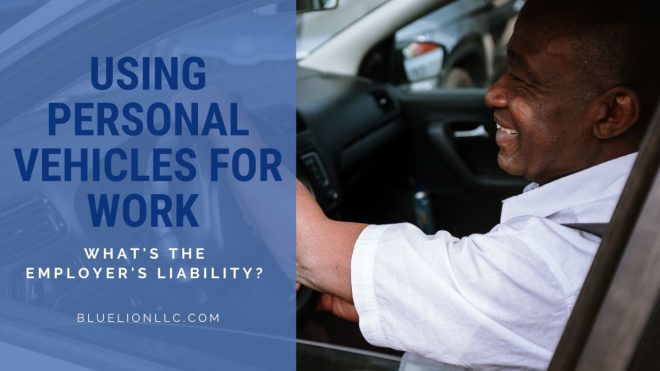
Do employees pose a risk to your business when they use personal vehicles for work duties?
The short answer: Yes! This is why it’s crucial that both employers and employees are sufficiently covered and employers understand their responsibility.
When an employee drives their own car, it’s referred to in insurance lingo as a “non-owned vehicle.” This simply means the company doesn’t own it. So, what happens when an employee is in an accident while driving their personal car for work-related purposes? Keep reading as we cover:
- Examples of work-related driving
- Employer responsibility and risk (workers’ compensation, insurance, and other liability)
- Employee responsibility
- How to protect your business and employees
What Qualifies as Work-related Driving?
When employees use a personal vehicle for work, there’s more to consider than mileage reimbursements.
It is considered business purposes when an employee uses their car for job duties while on the clock or performing a task at the employer’s request and benefit. A few examples include:
- Driving to sales and clients meetings
- Running company errands (e.g., going to the post office, bank, or office supply store)
- Picking up food for a company event
- Delivering something to another business
However, employers are not responsible for employees running personal errands. The coming-and-going rule also generally excludes the commute to and from work, which applies to both travel pay practices and accidents during work time.
What is the Employer’s Responsibility & Risk?
To understand your responsibility as an employer, you must understand vicarious liability. Also known as “respondeat superior,” it dictates that the employer is legally responsible for the actions of their employees. This includes negligent actions on the job or while driving for business.
If your employees are using personal vehicles for work, you could be on the hook for the following:
- Auto Insurance: Typically, commercial auto policies provide coverage when an employee’s auto insurance doesn’t fully cover the damages.
- Workers’ Compensation: Similar to workers’ compensation for remote employees, a company will have to pay out the benefit if an employee is injured in an accident performing work duties on company time—even in their own vehicle, no matter who was at fault.
- Liability Insurance: An employer’s liability insurance usually covers the costs of damages sustained by third parties, including medical bills, lost wages, and pain and suffering. It can also cover an employee’s legal fees if third-party claimants sue them.
- Negligent Entrustment: If a company gives a dangerous instrument (like a car) to an individual who is not equipped to handle it safely, and that individual causes injury to a third party, the company could be liable for punitive damages.
So yes, your business could be exposed if an employee gets in an accident while driving their personal vehicle for work reasons. At the very least, you’ll need to cover workers’ compensation for the employee.
A Note on Non-owned Auto Insurance
Non-owned auto liability insurance covers injury and property damage caused by vehicles owned by others, typically your employees. While it is usually added to a business auto policy, businesses without one can add it to their general liability insurance.
Non-owned auto insurance protects your business if you are found legally responsible for a car accident an employee had in their own car during company business.
What is the Employee’s Responsibility?
Employees who use their personal vehicle for work must have auto insurance. In an accident, the employee is usually responsible for their deductible and other damages to their car. Although the employer is usually not required to reimburse for these items, they could choose to assist the employee for car damages and insurance deductibles.
Employees are also responsible for:
- Accidents occurring while commuting or traveling between job sites
- Damage to their vehicle in a workplace parking lot or garage
Employee Personal Car Use: How to Protect Your Business
For many small businesses, employees using personal vehicles for work-related tasks is unavoidable—especially if they rely on salespeople or other professionals that need to be physically in the field.
Fortunately, there are several ways to protect your company and team members driving their own cars:
- Keep a record of all employees who drive (or could drive) personal vehicles for the business, including current driver’s licenses and safety inspection certificates.
- Mandate that employees have personal auto insurance with at least $500,000 in liability.
- Require yearly proof of employees’ personal insurance policy.
- Request that employees sign Motor Vehicle Authorization (MVR) forms and pull their records annually.
- Develop driver eligibility guidelines noting the maximum number and type of violations or accidents that disqualify employees.
- Invest in non-owned auto insurance and umbrella policies.
- Create a policy containing all the above details and guidelines for driving for company purposes, then have employees acknowledge and sign it. (Don’t forget to include it in your employee handbook!)
Do you have or are you planning to have employees use personal vehicles for work purposes? Ensure you’re covered and protect your team with adequate insurance and a comprehensive policy. If you have questions or want to discuss what your program should look like, contact BlueLion today at info@bluelionllc.com or 603-818-4131.
The information on this website, including its newsletters, is not, nor is it intended to be legal advice. You should contact an attorney or HR specialist for advice on your individual situation.


